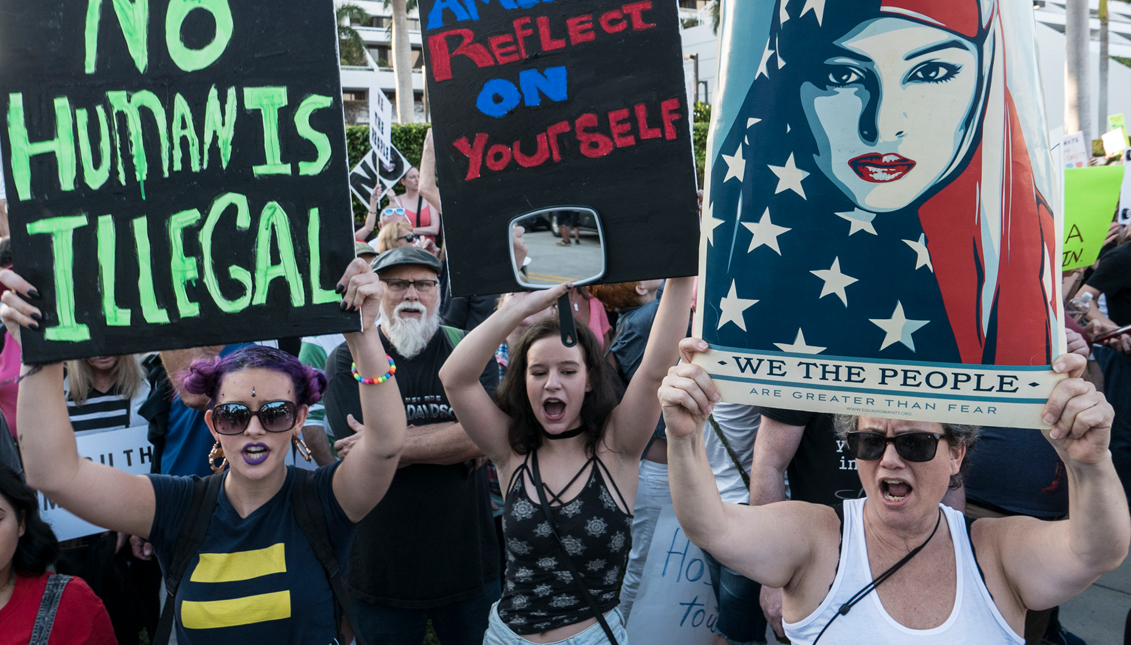
[OP-ED]: Trump’s policies may be awful, but they’re not ‘un-American’
If I hear one more of President Trump’s critics say that the administration’s crackdown on immigrants and refugees is “un-American,” I’m going to lose it.
If I hear one more of President Trump’s critics say that the administration’s crackdown on immigrants and refugees is “un-American,” I’m going to lose it.
Sen. Chuck Schumer, who managed to keep his composure while President Obama deported 3 million people over eight years, teared up after 109 people were detained under a temporary travel ban that the Democrat called “mean-spirited and un-American.”
Is Schumer even the least bit familiar with America? Because the country I love has never truly loved foreigners, regardless of whether they come here looking for opportunity or hoping for sanctuary. That’s just what it says in the brochure.
People who argue otherwise say that the United States takes in about 1 million legal immigrants each year. So what? In a country of 324 million people, which is supposedly a “nation of immigrants,” letting in less than 1 percent of our population annually is awfully weak.
Cracking down on immigrants and keeping out refugees -- usually because we consider them inferior to those who are already here -- is as American as schnitzel, chow mein, shepherd’s pie, spaghetti, bagels, tacos and falafel.
Check out this paradox. While many Americans boast that our cultural diversity is our strength, this hasn’t stopped many of us from reacting intolerantly to those with what some consider weird languages, strange religions and peculiar customs.
This tradition began in the mid-1700s, when Benjamin Franklin attacked German immigrants. An Englishman born in Boston, Franklin warned that Pennsylvania was becoming “a colony of aliens who ... will never adopt our language or customs, any more than they can acquire our complexion.” Franklin feared the newcomers would “Germanize us instead of our Anglifying them.”
Then there was the Chinese Exclusion Act of 1882. Concerned that arrivals from the Far East who had migrated to the American West to do the dangerous work of building the railroads were “unassimilable,” Congress decided to close the door. It wasn’t until 1943 that the law was repealed, and a yearly quota of Chinese immigrants was established.
In the 20th century, nativism ran like a virus through U.S. immigration policy. “Give me your tired, your poor, your huddled masses” quickly degenerated to “There goes the neighborhood.”
RELATED CONTENT
In 1905, Sen. Henry Cabot Lodge of Massachusetts warned that immigrants (read: the Irish) were “diminishing the quality of our citizenship.”
A couple decades later, declaring that “America must remain American,” President Calvin Coolidge signed the Immigration Act of 1924. The law -- which could have been called the “No More Italians Act” -- set quotas for each country based on how many people it had sent to the United States in earlier decades. The Germans and Irish were fine, but the Italians were out of luck.
It wasn’t until the Immigration and Nationality Act of 1965 that Congress scrapped this ghastly quota system based on national origin. In its place, it created a fairer, though still not perfect, system that put more emphasis on immigrants’ skills and family reunification.
Today, most immigrants to the United States come from Asia and Latin America, and many are greeted with the same mixture of intolerance and ignorance that earlier waves encountered.
Trump can be shameful, but he’s not terribly original. He is just the latest carnival barker to take advantage of the anxiety that the sons and daughters of the immigrants of yesteryear feel toward the immigrants of today.
And despite what some people like to believe, Americans don’t just have a problem with those who come to this country illegally. Legal immigrants are also a target. Just look at what’s coming next.
According to The Washington Post, the Trump administration is now contemplating closing the door to would-be immigrants who are likely to require public assistance and deporting current green-card holders who depend on welfare and other government programs. There are also plans to limit visas so that American workers can be spared the indignity of competing for jobs with foreigners.
This is bad policy that amounts to protectionism for American workers. But, like the refugee ban and the wall that Trump promises to build on the U.S.-Mexico border, it can’t very well be called un-American. In fact, it’s perfectly American. And that’s the misery of it.










LEAVE A COMMENT:
Join the discussion! Leave a comment.